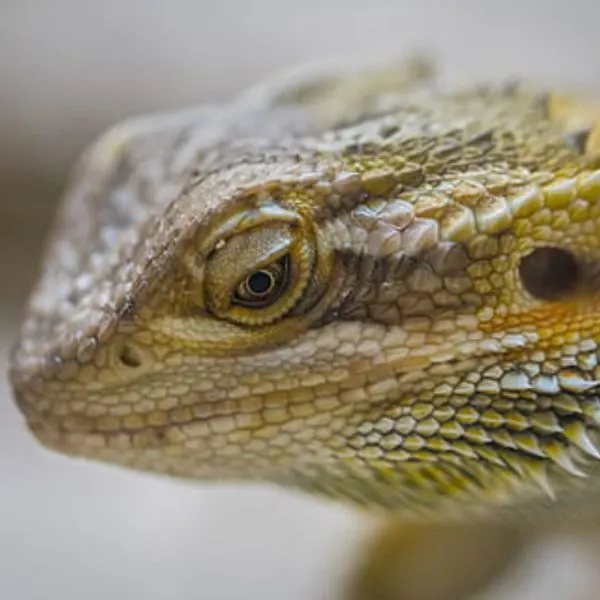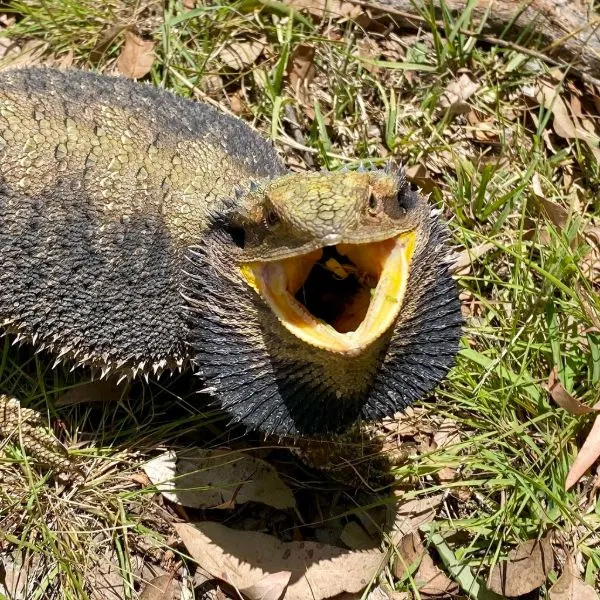Bearded dragon owners will tell you that their little companions definitely express themselves in different ways. A happy beardie will be active and possibly excited when the owner comes into the room, especially if they notice food or treats. But can bearded dragons get depressed?
Ask any beardie owner and they will tell you that the short answer is “Yes”, bearded dragons can certainly get depressed.
The overall consensus from owners is that bearded dragons regularly show a range of emotions through their actions. While they may not be as cuddly or expressive as dogs or cats, beardies all have different personalities and temperaments.
Though you won’t see a bearded dragon smiling at you, wagging its tail, or looking sheepish if he knows he was being naughty, scientific studies have shown that reptiles like bearded dragons actually can and do express a range of differing emotions. The most prevalent emotions shown are fear, aggression, or hunger, but they can also show signs of happiness as well as sadness and depression.
In this article, we will be going over whether a bearded dragon can become depressed, what the signs and symptoms of a depressed beardie are, and what can be done to battle depression in your bearded dragon.
How to Tell if Your Bearded Dragon is Depressed

Here are a few signs a bearded dragon will exhibit if it is sad or depressed:
Loss of Appetite
If your beardie isn’t eating much or has a basic disinterest in food then you know something is wrong, because bearded dragons like to eat. The problem with this symptom is it could also mean your dragon is not feeling her best physically, as well as being a sign of depression. If loss of appetite is accompanied by other symptoms like vomiting, or diarrhea, you should consult your vet because it could be signs of an illness.
Lethargy
Just like people, when bearded dragons become depressed, they probably don’t want to move around much. If your dragon is lethargic, is moving around the enclosure slowly, goes to the food bowl to eat, but without the excitement and enthusiasm he normally exhibits, this could be a sign of a depressed dragon.
Too Much Sleep or Trouble Opening Eyes
Are your beardie’s eyes closed all the time; only opening them slightly on occasion then closing them back again? Is it sleeping most of the day away? This could definitely be a sign of depression.
Aggression
Bearded dragons will occasionally puff out their lower jaws and turn the skin black if they are feeling threatened, or angry. It’s where the name comes from. In otherwise healthy dragons they shouldn’t be expressing this angry emotion all the time, but if yours is, this could be a sign he is always angry, or depressed.
Different bearded dragons have varying temperaments, and constant aggression could be your beardie’s way of telling you it isn’t feeling happy-go-lucky.
Does she flatten out when you try to touch her or pick her up? Is he showing a black beard to you, or attempting to bite when you come near? This could be a sign of depression.
Hiding A Lot of the Time
If your dragon’s enclosure has hiding places does your beardie stay hidden most of the time? This could be a sign of depression. Most dragons do enjoy a little hiding place they can go to regulate their temperature or hide in the shade for a moment if they’ve had enough light, but they shouldn’t spend most of their time in the shadows.
An otherwise healthy and happy beardie will go into a hiding place for a little while but then come back out. If yours is hiding from the world all the time, he could be feeling depressed.
If any or all of these above symptoms present themselves in your dragon it could be feeling depressed. If other symptoms present themselves along with the above, such as abnormal stools, weight loss, vomiting, or discoloration, then your dragon might be ill, and a visit to the vet is needed.
Possible Causes of Depression in Bearded Dragons

The biggest causes of depression in a bearded dragon are boredom and lack of stimulation inside and outside of its enclosure. In the wild, bearded dragons are always on the lookout for predators, food, and intruders to their little piece of property. There is always stimulation for bearded dragons in the wild.
Boredom
If their enclosure is flat and boring, food is always presented to them in the same way, and there is no time to run around and explore, then it’s likely the dragon will become depressed.
If the tank is too small for the bearded dragon, then it can feel like a prison cell instead of a comforting home and the beardie will become sad and depressed. An adult bearded dragon requires an enclosure between 75-120 gallons to be able to maneuver and get enough exercise. Make sure your dragon has plenty of space.
Beardies Need Stimulation
A proper enclosure for your dragon should contain climbing branches, a hiding place or two, and a shallow water dish and food bowl. It’s also recommended to change it up and move things around every time you clean the tank. This will help stave off the depression.
Don’t forget to take your beardies out of the enclosure frequently and let them run around and explore outside of the tank. This is a perfect time to introduce toys, treats, or just let them explore at their leisure.
How to Cheer Up a Depressed Bearded Dragon

Now that you know if your bearded dragon is feeling depressed, what can you do to cheer up your beardie? This isn’t as difficult as some might think so here are some easy fixes to help get your beardie out of its funk:
Offer Stimulation
One of the easiest ways to cheer up a bearded dragon is to offer some stimulation. This can be as simple as changing the enclosure around. Try out some climbing sticks, a bearded dragon hammock, or this mealworm feeder to offer a change and stimulation.
Go Outside
Is the weather outside warm and sunny? If so, taking your beardie outside to get some beneficial, natural sunlight, and time to explore is a great way to battle depression and let your dragon get some exercise.
Play With Toys
Toys are a wonderful way to battle depression and add a lot of stimulation. You don’t even have to spend a lot of money on toys, like small balls, or even cat toys can offer plenty of stimulation. Just make sure the toys aren’t small enough to be swallowed or have easily broken parts that can be eaten.
Bath Time
Give your dragon a bath. Baths are not only stimulating but are extra beneficial for your dragons. It gives them bonding time with you, and they get extra hydration, not to mention a good soak is always relaxing.
Touch is Beneficial to Your Dragon
Handle your dragon. Pick him up, let him climb on you, or just gently stroke him for some extra stimulation. The bonding will certainly help with depression and sadness.
Be sure to listen to your dragon though. If he is showing signs of aggression when you reach for him like flattening out or showing a black beard, let him have his space. Come back when he is calmer.
Check out YouTuber GoHerping’s video progression of caring for a sad beardie:
Conclusion
Can bearded dragons become depressed? The quick answer is a resounding YES! Bearded dragons can have emotions including depression and express them in subtle ways. As a conscientious beardie owner, you will undoubtedly notice your pet’s differing moods.
The good news is a depressing beardie can be brought out of the darkness relatively easily. If you suspect your beardie is suffering from depression, the best way to help them is to offer stimulation.
In the wild, they are dependent upon themselves for survival, from hunting for food, avoiding predators to finding mates, so they have plenty of stimulation. As a pet, all their needs are provided for them, and sometimes this can cause depression if it’s the same routine day in, day out. Change it up, offer different stimulation on a regular basis, and you will have a happy healthy dragon for years to come.
References:
Helen Lambert, Gemma Carder, Neil D’Cruze
Animals (Basel) 2019 Oct; 9(10): 821. Published online 2019 Oct 17. doi: 10.3390/ani9100821
https://www.ncbi.nlm.nih.gov/pmc/articles/PMC6827095/
More bearded dragon stuff
- What do bearded dragons eat?
- Why is my beardy aggressive?
- Best foods for bearded dragons
- Why does my beardy close its eyes?
